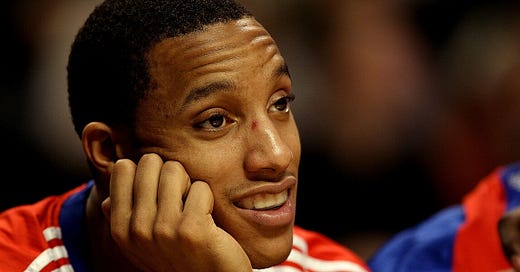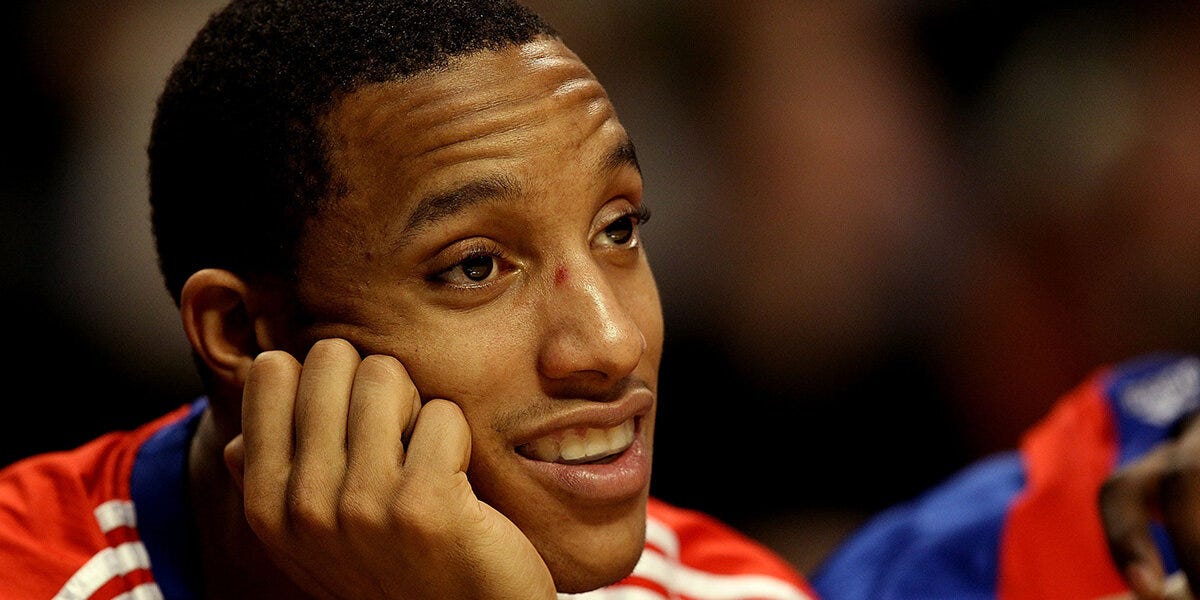Ten Years of Evan Turner, The Most Sixers No. 2 Draft Pick Ever
It seems like 100 years ago.
Andrew Unterberger is a famous writer who invented the nickname 'Sauce Castillo' and is now writing for The Rights To Ricky Sanchez, as part of the 'If Not, Pick Will Convey As Two Second-Rounders' section of the site. You can follow Andrew on Twitter @AUGetoffmygold and can also read him at Billboard.
Andrew's writing is brought to you by Kinetic Skateboarding! Not only the Ricky's approved skate shop, but the best place to get Chucks, Vans, any apparel. Use code "DAVESILVER" for 9.1% off your order.
Everyone in basketball agrees: The No. 2 pick stinks. In the past 20 drafts, only five No. 2 picks have ever gone on to be All-Stars, and maybe half of them ever even went on to be consistently reliable starters. Some of those picks were wasted on all-out disasters like Hasheem Thabeet and Darko Milicic, but most of the No. 2 flops weren't stunning failures -- they just weren't stunning anything, serviceable journeyman like Marvin Williams and Emeka Okafor or one-way wonders like Michael Beasley or Michael Kidd-Gilchrist. Triangulate all of 'em to find the exact midpoint player, and you'd probably end up with the guy the Sixers took ten years ago: the man they (really just me and Mark Titus) called The Villain, Evan Turner.
Looking back on it, Evan Turner feels impossibly inevitable for the 2010 Philadelphia 76ers. The 2009-'10 season -- the year of Eddie Jordan, Point Lou, and Iverson 2.0 -- had gone disastrously, but in grand then-Sixers fashion, not quite disastrously enough to likely result in a high lottery pick. They finished sixth in the tanking rankings, which shouldn't have been enough to land a star in a not-considerably-deep draft. But on lottery night, they rose the same wave of positive karma that somehow allowed the Flyers to come back to beat the Bruins in the second round that year after falling down 3-0, and they jumped into the top three. We especially rejoiced when the No. 3 pick was revealed as belonging to the New Jersey Nets -- we were immediately next up after that, but no matter. According to just about everyone, it was a two-player draft, and we had one of the top two picks. Needless to say, we got the one we deserved.
Those two players were John Wall and Evan Turner. At first it seemed like there might be a little debate over who would go first overall, but UK freshman sensation Wall quickly separated himself on big boards from late-blooming Ohio State star Evan Turner. Fine by us: Turner seemed the more readymade product, a do-everything positional hybrid who passed like a guard but rebounded like a forward, with a scoring killer instinct, a backstory of triumphing over adversity and a baby face whose cheeks seemed eminently pinchable. You didn't need to watch college basketball to know what a big deal Evan Turner was; you probably still saw that 35-foot buzzer-beater he hit to beat Michigan a dozen times. The period it takes for me to talk myself into a player is always more Milo Goes to College than Zen Arcade, but with Turner in particular I was in before the first verse. Finally, I probably said out loud at some point, Andre Iguodala will have the Michael Jordan to his Scottie Pippen.
It didn't long for Evan Turner to teach us maybe the toughest draft-night lesson to internalize as an NBA fan: When they say a player does everything, it really means they do nothing. Not at the level you need, anyway: Evan Turner was a decent passer, a pretty good rebounder, an occasionally effective player in the fast break. But you watched him at the pro level and kept waiting for the easily defined megaskill to jump out -- the one thing he was obviously great at; hell, the one thing you could see the path to him becoming obviously great at -- and it just never showed. John Wall was mistake-prone, had a lousy jumper and took five years off Skip Bayless' life by doing the Dougie in the Wizards huddle before his first game, but at the very very least, you knew the dude was fast. ET's lack of obvious basketball superskill was not compensated for by jaw-dropping athleticism; he navigated the half court against NBA defenders like he was doing guess-and-check tests in an Escape Room.
We hoped he would get better -- like he did in college. I had a blog discussion with Mike when I was at The 700 Level and he was at Liberty Ballers, and he responded to my question about what he says to folks getting impatient with Turner's early struggles by saying, "After I stab them in the throat, I wipe some of their blood away and show them his stats at OSU." It was enough to hold onto for those first few years, particularly after he had an OK showing against the Heat in the first round of the 2011 playoffs. He's a big-game player! He just needs time to become an every-night guy. And every month or two, we'd get a four-five game stretch where it looked like he was turning the corner, connecting on that flat jumper, putting up major stats and leading the Sixers to tough Eastern Conference victories. Was he actually doing anything different, or were the shots just going in? The shots were just going in, of course -- but maybe now they always would, forever?
They wouldn't. They never did for long. By the time he was given the keys to the offense in his fourth season as a Sixer -- Hinkie's first -- it was clear what Evan Turner got you: Decent volume scoring and the occasional game-winner, as long as he got plenty of cracks at both and there were absolutely no better options in the meantime. When it was time for him to be traded to the Pacers at the 2014 deadline -- jettisoned along with the rest of the team's players with any degree of name recognition -- there was much rejoicing on Philly Twitter. We could never totally embrace the Process and self-actualize under Our Once and Always Dark Lord Sam Hinkie as long as ET was still there to remind us of the Before-Sixers, and their infuriating prioritization of the veneer of acceptable proficiency over ever actually doing anything noteworthy.
Evan Turner wasn't a bad player, though. Well, he didn't have a bad NBA career, anyway. After flopping in Indiana, he went on to convince the Celtics he was actually a point guard all along -- or at least, the Celtics used him to convince the rest of the NBA that he was a point guard all along, and that he was thriving in that role while really putting up fairly similar to those he posted in Philly. It was enough for the Blazers to give him a four-year, $70 million contract, the kind of deal usually reserved for players most NBA fans can conclusively agree is good. Not so with Evan, who predictably underwhelmed in Portland but still hung around long enough to help secure the Blazers their biggest playoff win in 20 years, with a surprise fourth-quarter burst against the Denver Nuggets in Game Seven of the Western Semis. It's probably over for Evan in the Association after he was shipped to Atlanta last year and never even played for Minnesota after getting traded there midseason -- but ten years is still a pretty long NBA tenure. Plus, you never know who's out there with a ten-day contract and an assistant coach who never stopped believing The Villain from OSU remains waiting to be unleashed.
Truth told, that whole 2010 draft was a minefield. No. 3 pick Derrick Favors muddled along to the kind of solid-but-inconsequential career that will inevitably get him forgotten by Sporclers for generations to come. No. 4 pick Wesley Johnson washed out even before ET did; he always made being a professional basketball player look absolutely exhausting. No. 5 pick DeMarcus Cousins would've almost certainly been the Hinkie upside pick, and probably would've been widely beloved by Sixers fans even as he made them hate themselves; after three years of DMC the franchise would've probably ended up where they did anyway after the Andrew Bynum trade. Greg Monroe. Ekpe Udoh. Al-Farouq Aminu. Gordon Hayward ended up being the best-case version of Evan Turner's player type at No. 9 and Paul George ended up being the best player in the draft outright at No. 10, but you have to go that deep to find players whose NBA careers you'd definitely take today over Evan's decade in the pros.
But the Turner pick still frustrates a decade later, because it's hard not to feel like we should have been smart enough to know that it wasn't going to happen with him. A couple years later and we probably would've been able to suss out that the guy with no elite skills or athleticism who took till his junior year to breakout in college wasn't going to be a star in the pros -- but at the time, perceived wisdom was still good enough to make us put a lot of stock in Big Ten highlights and one (admittedly still pretty balling) buzzer-beater. Some of those other guys busted for lack of motor, for having a losing mentality, for just not developing the skills they needed to adapt to the modern game -- but at least there was an obvious failure of development to point to as the difference-maker for them. With Evan, you look back and wonder what we were even hoping for in the first place.
It does at least feel like something that the Sixers, and maybe most other teams, have learned from in the years since. For all the faults of Elton & Team Collaborative GM, their big swings the past two drafts -- Zhaire Smith and Matisse Thybulle -- weren't on college stars expected to take on immediate offensive roles in the pros, but athletic, raw talents with a couple easily identifiable upside skills. It's hard to imagine a player like ET ever going No. 2 again at a time when even Michael Jordan is drafting high-variance Calipari products, and it's certainly unlikely we'll have to worry about those types with Daryl Morey, a GM who seems to prefer bargain-basement shopping to big-item auction bidding anyway. But the memory of Evan Turner continues to haunt both the post-Process Sixers and the middling legacy of the No. 2 overall pick, a persistent reminder of what happens when good enough is good enough for your franchise, and when you bank on a player being can't-miss because even their hits are pretty bleh.







